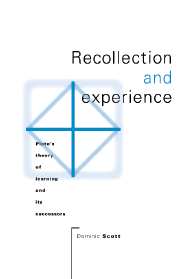Book contents
- Frontmatter
- Contents
- Acknowledgements
- Abbreviations
- GENERAL INTRODUCTION
- SECTION I PLATONIC RECOLLECTION
- SECTION II ARISTOTELIAN EXPERIENCE
- SECTION III HELLENISTIC CONCEPTS
- Introduction
- 7 Hellenistic philosophy and common sense
- 8 Innateness in the Hellenistic era
- INTERIM CONCLUSIONS
- SECTION IV INNATISM IN THE SEVENTEENTH CENTURY
- CONCLUSION
- Bibliography
- Index of ancient passages
- General index
8 - Innateness in the Hellenistic era
Published online by Cambridge University Press: 03 December 2009
- Frontmatter
- Contents
- Acknowledgements
- Abbreviations
- GENERAL INTRODUCTION
- SECTION I PLATONIC RECOLLECTION
- SECTION II ARISTOTELIAN EXPERIENCE
- SECTION III HELLENISTIC CONCEPTS
- Introduction
- 7 Hellenistic philosophy and common sense
- 8 Innateness in the Hellenistic era
- INTERIM CONCLUSIONS
- SECTION IV INNATISM IN THE SEVENTEENTH CENTURY
- CONCLUSION
- Bibliography
- Index of ancient passages
- General index
Summary
INNATENESS AND EPISTEMOLOGY
Epicurus and the Stoics appealed to the natural origin of our prolepses to explain their reliability. In doing this they were certainly differentiating prolepses from concepts formed by education or some other cultural process. But if prolepses are formed by a process of nature, that process could be the result either of innateness or merely of sense perception, which was construed by both schools as an essentially natural process. As I have already said, there is considerable controversy among scholars, both in the case of Epicurus and of the Stoics, as to whether any of these natural notions were actually innate notions.
One explanation for the divergence of opinion among scholars is the state of the evidence, especially in the case of Epicurus. But this is not the only one. When we attempted to determine Aristotle's attitude to innatism in chapter 3, we came up against the need to distinguish different varieties of innatism and to clarify the opposition between innatism and empiricism. The same goes for the Hellenistic philosophers. The scholarly controversies that have raged over which, if any, of these philosophers espoused innatism have arisen partly out of a lack of clarity on these philosophical issues. So before turning to the texts, we need to recall some of the points made about the innateness debate in chapter 3.
On pp. 91–3, we drew a distinction between two different ways in which we might talk of innate knowledge, beliefs or concepts: according to one theory these items might be latent in the mind from birth; according to another we have inborn predispositions to acquire them.
- Type
- Chapter
- Information
- Recollection and ExperiencePlato's Theory of Learning and its Successors, pp. 187 - 210Publisher: Cambridge University PressPrint publication year: 1995



